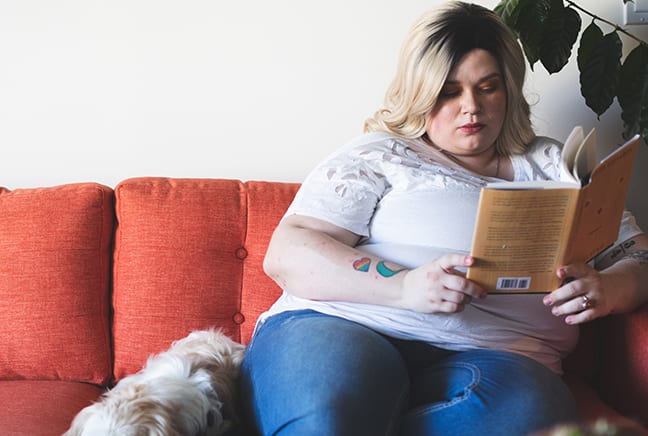The link between obesity and coronavirus is scientifically apparent; being obese increases your risk of suffering complications if you catch it.
The current COVID-19 pandemic that we are living through is causing many challenges in society. Aside from the health risks of contracting the disease, it is also affecting the food we buy and consume and our physical activity levels too.
More and more, we are buying long-life, processed foods that will keep in the cupboard but are full of additives and sodium to help keep them fresh. Whilst they are effective on cost, consumption of these types of food over a sustained period will eventually lead to weight gain.
Combining poorer eating habits with the reduction of activity time is a recipe for raised levels of obesity in the UK when the lockdown eventually comes to an end. Not only this, there is also concern about how obesity and coronavirus are linked and how the disease can place an increased risk on this group.
Given that a study conducted by the NHS in 2017 showed that 29% of adults are obese and a further 36% of adults are overweight in the UK already, the lockdown could prove to be an issue for the levels of obesity in the country and increase the complications of obesity. It could also add additional strains on the NHS with regard to obesity related illnesses, even when life resumes as normal.
Does being overweight or obese increase your risk of contracting or suffering complications of COVID-19?
As coronavirus has developed, it is clear that there is a link between obesity and coronavirus, with obese groups being at an increased risk of suffering complications.
When the disease first arose at the beginning of 2020, we were immediately able to identify a number of ‘at-risk’ groups who are more likely to suffer the effects of COVID-19 worse than others or are more susceptible to contracting it.
These groups include those with debilitating illnesses such as cancer, respiratory diseases like asthma and the elderly. However as time has passed, recent studies have identified that the risks of obesity are heightened if you contract coronavirus and obese people are more susceptible to it.
An April 2020 study made in French hospitals on patients suffering from COVID-19 showed that a high percentage of those admitted to intensive care for treatment also had high BMIs. The study also showed that the severity of infection also increased – so the higher the BMI, the worse the infection.
What’s more, a report by the Intensive Care National Audit and Research Centre found that almost three quarters of people – 4387 patients of 6005 surveyed – who are severely affected by COVID-19 and require hospitalisation in the UK are either overweight or obese.
Additionally, approximately 40% of those who had a BMI over 25 and required hospitalisation in the UK unfortunately lost their lives to the infection.
Why are obese or overweight people more at risk of coronavirus?
With 65% of adults in the UK currently being affected by obesity or being overweight, we can make the assumption that the pandemic will naturally affect a lot of people who are overweight or obese.
The coronavirus obesity link is prominent due to the health issues that being overweight can cause, which makes you more susceptible and increases the complications of other illnesses. For example, having a raised BMI generally increases your chances of weight-related illnesses like heart disease and type 2 diabetes. This means that you can also fall into one of the at-risk categories for the virus.
But what about the effect on patients who are overweight or obese, but are otherwise, in good health?
Obesity and coronavirus are linked more than you might originally suspect, even if you feel relatively well and healthy in yourself. Being overweight or obese means that you have a lot more stored fat than those who have healthy BMIs. Stored fat can lead to higher levels of inflammation, which in turn, can negatively impact the effectiveness of your immune system. Your immune system battling the inflammation leaves your body at a higher risk of contracting the virus as it is not strong enough to fight off the COVID-19 infection.
If you find that a lot of the excess weight you are carrying is around your waist and stomach, this can also mean that your lungs find it harder to get the air they need and become less efficient when faced with a viral respiratory infection like COVID-19.
How can you decrease the complications of obesity should you contract coronavirus?
A simple way to help reduce the complications of both obesity and coronavirus is to reduce your weight and, in turn, your BMI. We understand that is easier said than done during current times, which is why our entire clinic team are working online to help you achieve your goals.
We at The Slimming Clinic know all-too-well the temptation to snack, graze, eat more and move less whilst we are in a country-wide lockdown and feeling stressed, anxious or bored. But, keeping your health a priority is more important than ever.
We know it can be easier to put off looking after your health when you’re busy or having to keep children occupied all day, but you can also use this time as a brilliant chance to help develop new, healthier habits and a broader awareness of good nutrition and the importance of keeping active.
How can The Slimming Clinic help you stay healthy and lose weight during lockdown?
If prioritising your health seems hard to do alone right now, The Slimming Clinic can help make it easier for you. Let us support and help you to lose weight and improve your health by speaking to our wonderful GMC-registered weight loss doctors. We are currently offering online weight loss programmes, where our doctors are there to discuss any concerns, issues or worries you have relating to your health and weight.
We can also give you access to our range of weight loss treatments from the comfort of your own home. You can speak to our experts in diet, movement and mindset, who can support you in all aspects of your journey. They can offer give you tailored advice and motivate you along the way to reaching your goals whilst at home.
Our online weight loss programmes are provided via telephone consultations with our weight loss clinic team and, where required, we will deliver your weight loss medication to your door by secure courier.


